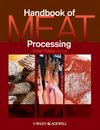When a job is not a career — Part 2
Comedians need it, keynote speakers ask for it, politicians should pay more attention to it, and this editor welcomes it: feedback. Based on responses I received, we hit a few nerves out there with our "Top Meat and Poultry Companies to Work For" feature and my job-versus-career discussion in the past month. Thank you for your e-mails and letters.
I am revisiting the "sick workplace syndrome" again in this issue to report a true story in which a West Coast processor and company team members locked horns with an FSIS inspector, survived the ordeal in good stead, and came away with respect and appreciation for the challenges confronting federal regulators.
The complainant is granted anonymity herein "for obvious reasons." I offer these excerpts from the much longer account of the ordeal.
This is a report of an inspector-gone-bad, and how her arrogant and above-the-law attitude finally forced her feet to the fire.
Who can't tell an inspection horror story? As vice president and owner of a meat processing facility, I can certainly tell my share. Although it definitely started out that way, this is not another inspection horror story but rather one that ends with a renewed respect for FSIS.
Last year, a veteran inspector reputed to be extremely tough and abusive rotated into our establishment and we found ourselves in an abuse-of-power nightmare that threatened our company and employees beyond imagination. The inspector immediately cited multiple examples of painful and drastic measures she had taken to put other facilities in their place. She also related how management at other facilities where she was assigned tried to get rid of her without success because she was "untouchable."
It was frightening to learn other companies had taken action and failed, but our collective quality of life warranted the risk in trying to end the harassment. We knew we might be gambling with the possibility of angering those in the very agency that would regulate us for the duration of our careers.
My company basically enjoys good professional relationships with our inspectors because we follow the rules, keep a clean facility, and normally receive only a handful of Non-Compliance Reports each year.
The best advice I ever received came from a former IIC (inspector in charge), who advised me to learn the code of federal regulations because industry and inspectors live by the same code. To tell you the truth, that was a burden I did not want, but recognized the necessity in today's meat production environment.
We ultimately filed a grievance with the FSIS district manager basing the complaint against our abusive inspection on Directive 4735.7 (Industry Accusations Against Inspection Personnel) after concluding her non-compliance with FSIS Directive 4735.3 (Employee Responsibilities and Conduct).
The district manager handled the matter professionally even when the situation intensified to the point that the inspector was temporarily removed from our facility until federal mediation under VDIP (Voluntary Dispute Intervention Program).
These are key points in the process:
- An unbiased third-party observer was assigned to the facility whenever the inspector in question was on duty.
- The observer was charged with witnessing interpersonal skills of everyone without judging the inspector's performance of her duties.
- FSIS management verified proper inspection methodology.Ultimately the inspector chose reassignment, but the whole experience — while stressful — left me with a renewed respect for FSIS, the system, and the individuals involved in the process.
As always, I welcome your feedback.



Report Abusive Comment